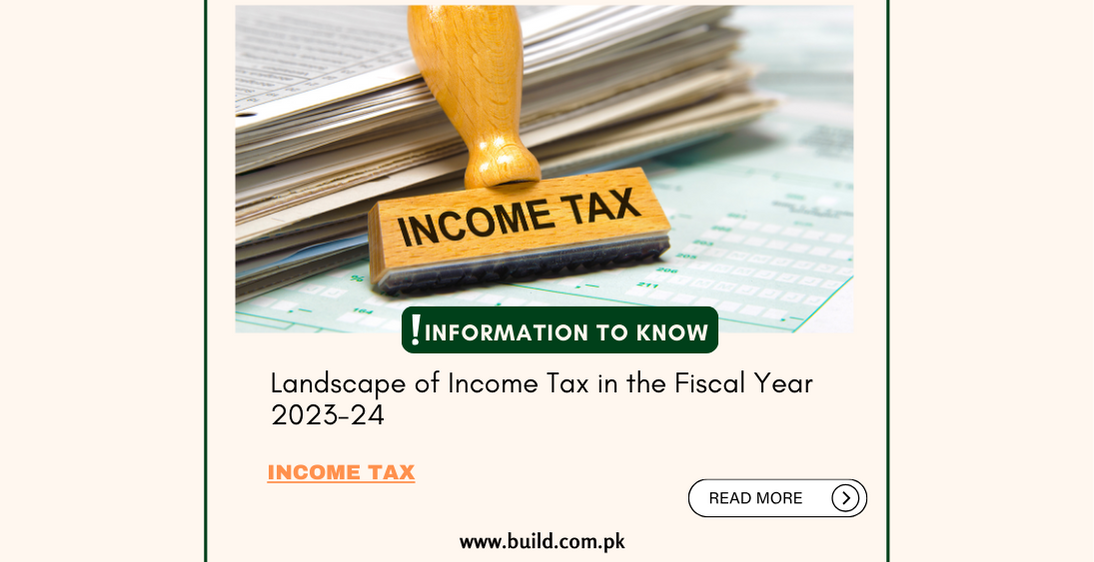Landscape of Income Tax in the Fiscal Year 2023-24

Introduction:
Income tax is a cornerstone of fiscal policy, playing a
pivotal role in government revenue generation and economic governance. As we
delve into the fiscal year 2023-24, understanding the intricacies of income tax
becomes paramount for individuals, businessesand policymakers alike. In this
extensive blog, we embark on a detailed exploration of income tax in the fiscal
year 2023-24, unraveling its key concepts, regulations, implications, and
considerations for taxpayers in various sectors.
Understanding Income Tax:
Income tax is a direct tax levied on the income earned by individuals, businesses, and other entities within a specific jurisdiction. It serves as a primary source of revenue for governments, funding public services, infrastructure development, and social welfareprograms. In the fiscal year 2023-24, income tax regulations and policies are governed by the relevant tax authorities in each country, with periodic updates and amendments to reflect changing economic conditions and fiscal priorities.
Key Components of Income Tax in 2023-24
Taxable Income:
Taxable income refers to the total income
earned by an individual or entity during the fiscal year, including salaries,
wages, business profits, investment returns, and other sources of income.
Certain deductions, allowances, and exemptions may be applicable to arrive at
the net taxable income.
Tax Rates and Brackets:
Income tax rates and brackets determine the percentage of tax payable based on different income levels. In the fiscal year 2023-24, tax rates and brackets may vary depending on the jurisdiction, with progressive taxation systems imposing higher taxrates on higher income levels.
Tax Deductions and Allowances:
Tax deductions and allowances
are provisions that reduce the taxable income, thereby lowering the overall tax
liability. Common deductions and allowances include expenses related to
healthcare, education, mortgage interest, charitable contributions, and
retirement savings.
Tax Credits:
Tax credits are incentives provided by the
government to encourage specific behaviors or activities, such as investments
in renewable energy, research and development, or employment generation. Tax
credits directly reduce the amount of tax payable, offering a direct financial
benefit to taxpayers.
Filing and Compliance:
Taxpayers are required to file income
tax returns within the prescribed deadline, accurately reporting their income,
deductions, and tax liabilities. Failure to comply with tax regulations or
submit timely returns may result in penalties, fines, or legal consequences.
Implications for Individuals and Businesses
Individual Taxpayers:
For individual taxpayers, income tax
obligations in the fiscal year 2023-24 encompass various sources of income,
including employment income, investment income, rental income, and
self-employment income. Understanding tax deductions, allowances, and credits
can help individuals optimize their tax liabilities and maximize savings.
Businesses:
Businesses are subject to income tax on their
profits, with tax liabilities determined by factors such as revenue, expenses,
deductions, and credits. In the fiscal year 2023-24, businesses must navigate
complex tax regulations, compliance requirements, and tax planning strategies
to manage their tax obligations effectively.
Considerations and Planning Strategies
Tax Planning:
Proactive tax planning is essential for
individuals and businesses to minimize ax liabilities, maximize savings, and
ensure compliance with tax regulations. Strategies such as income deferral,
expense management, retirement planning, and investment optimization can help
optimize tax outcomes.
Compliance and Documentation:
Maintaining accurate financial
records, receipts, and documentation is crucial for tax compliance and audit
preparedness. Timely filing of tax returns, adherence to reporting
requirements, and transparent communication with tax authorities are integral
to avoiding penalties and legal issues.
Professional Advice:
Seeking professional tax advice from
qualified tax advisors, accountants, or tax consultants can provide valuable
insights, guidance, and support in navigating complex tax regulations, planning
strategies, and compliance obligations.
Conclusion:
In conclusion, income tax in the fiscal year 2023-24 represents a multifaceted landscape characterized by regulations, obligations, implications, and considerations for taxpayers across various sectors. Understanding the key components of income tax, its implications for individuals and businesses, and effective planning strategies is essential for optimizing tax outcomes, ensuring compliance, and achieving inancial goals. By staying informed, proactive, and engaged in the tax planning process, taxpayers can navigate the intricacies of income tax with confidence and clarity in the fiscal year 2023-24.









